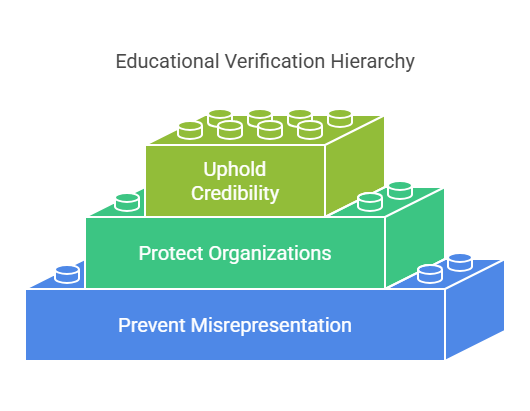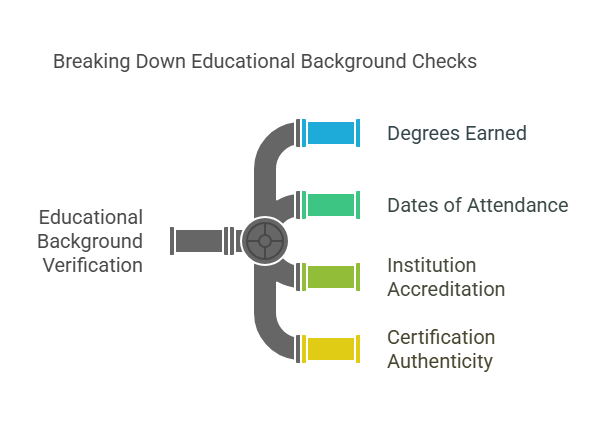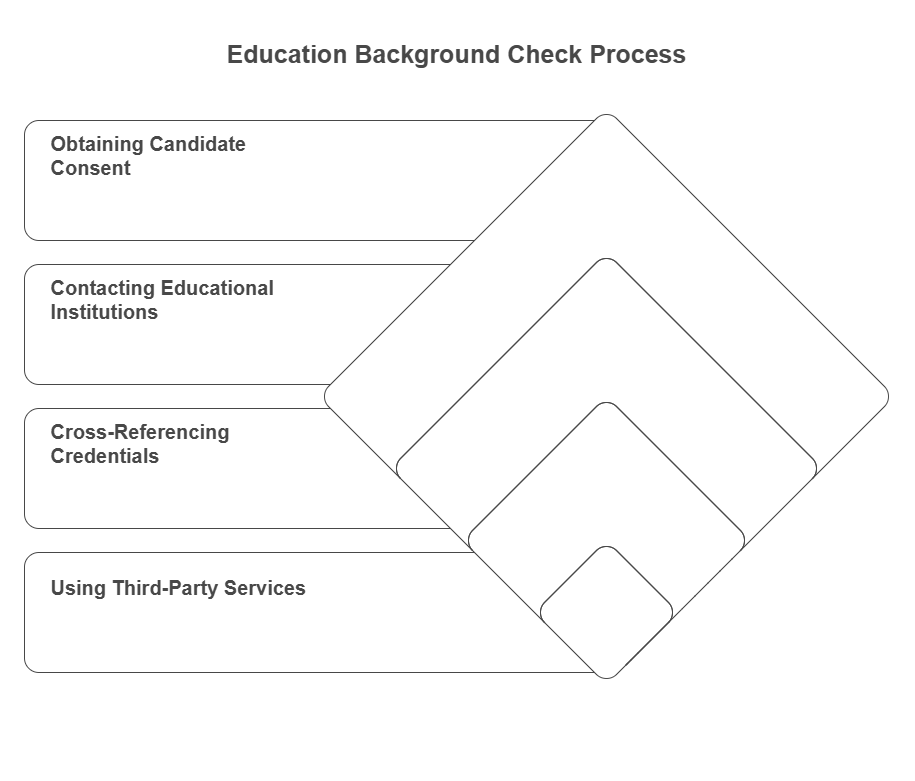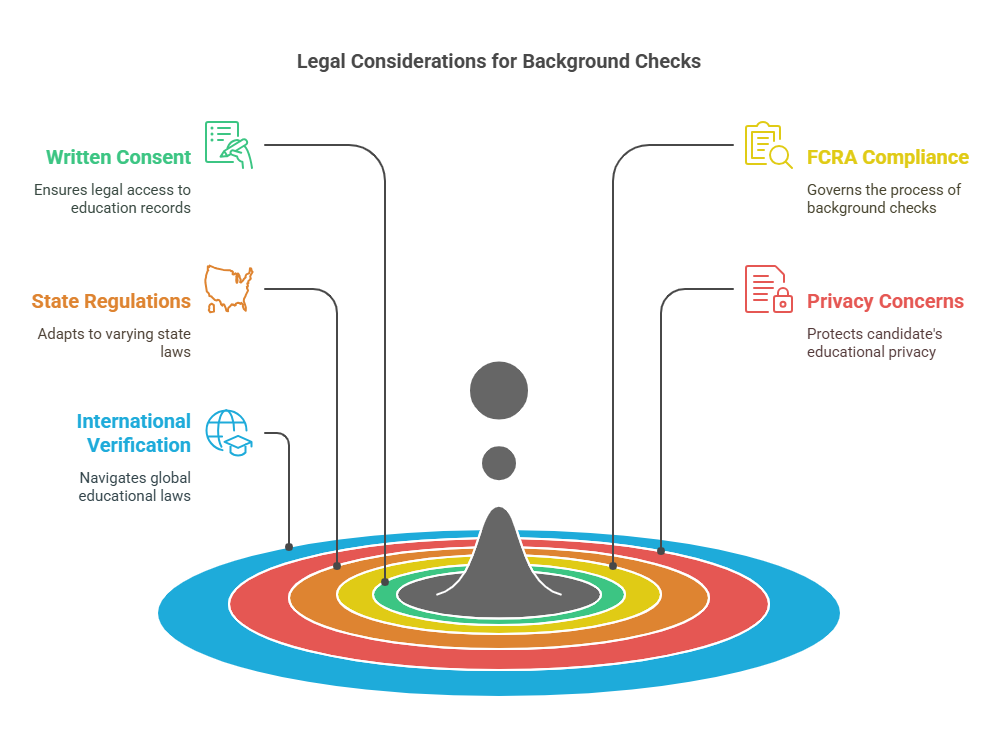Steps for Performing an Education Background Check

Understanding Education Background Checks
An education background check is a verification process used to confirm the academic credentials and educational history claimed by a candidate. This essential part of pre-employment screening helps employers ensure that applicants possess the qualifications necessary for the role.
Why Is It Important?

Education background checks are critical because they:
- Prevent misrepresentation of qualifications.
- Protect organizations from hiring unqualified candidates.
- Uphold the credibility and integrity of the workplace.
With the increasing prevalence of resume fraud and degree mills, verifying educational credentials is more crucial than ever for businesses.
What Do Employers Verify in an Education Background Check?

Employers review various aspects of a candidate’s educational history to ensure accuracy and legitimacy. Below are the key components verified during the process:
- Degrees Earned
- Confirmation of the degree(s) listed on the resume (e.g., Bachelor’s, Master’s, Ph.D.).
- Dates of Attendance
- Verification of the years the candidate attended the institution to detect discrepancies.
- Institution Accreditation
- Ensuring the institution is accredited and recognized by the appropriate educational authorities.
- Certification Authenticity
- Checking whether certifications or specialized training programs are genuine.
These details allow employers to verify that candidates meet the educational qualifications required for the job.
Who Conducts Education Background Checks?
Education background checks are typically conducted by:
- Employers
- Many companies handle education verification in-house, especially for smaller-scale hiring.
- Third-Party Screening Services
- Professional background check providers, such as Exact Background Checks, specialize in efficient and accurate education verification.
Industries Where Education Verification Is Critical:
Certain industries require stringent education verification to ensure compliance and safety:
- Healthcare: To validate medical degrees and licenses.
- Education: To confirm teacher certifications and qualifications.
- Law: To verify law degrees and bar memberships.
Common Reasons for Education Verification
Employers verify education credentials for several reasons:
- Preventing Fraud or Misrepresentation
- A 2017 CareerBuilder survey found that 75% of employers caught candidates lying on their resumes. Education misrepresentation is a common issue.
- Ensuring Job Qualifications
- For roles requiring specialized knowledge, verifying educational credentials ensures that the candidate is truly qualified.
- Protecting Organizational Reputation
- Hiring unqualified candidates can damage a company’s reputation and lead to costly mistakes.
How Are Education Background Checks Conducted?

The education verification process involves several steps to ensure accuracy and compliance:
- Obtaining Candidate Consent
- Employers must inform candidates and receive written consent before conducting a background check.
- Contacting Educational Institutions
- Verification involves reaching out to the registrar’s office or designated verification departments of schools, colleges, or universities.
- Cross-Referencing Credentials
- Employers compare the information provided by the candidate with official records to identify discrepancies.
- Using Third-Party Services
- Companies like Exact Background Checks streamline the process by accessing databases, liaising with institutions, and delivering accurate reports.
Why Are Education Background Checks Important?
Education background checks are a crucial component of a thorough hiring process, providing several benefits to employers:
- Ensuring Qualified Hires
- Education checks allow employers to verify that candidates have the necessary qualifications to perform the job. For positions requiring specialized education (such as healthcare, legal, or engineering roles), verifying degrees and certifications ensures that the candidate has the appropriate academic foundation.
- Minimizing Risk
- By ensuring that educational qualifications are legitimate, employers can minimize the risk of hiring someone who has falsified their credentials. This helps to avoid potential legal issues, especially in regulated industries where specific qualifications are mandated by law.
- Safeguarding Company Reputation
- Companies are at risk if they hire someone without the necessary credentials, particularly in roles that directly affect the public, such as healthcare or law. Verifying education ensures that the organization upholds its reputation by hiring qualified individuals.
- Compliance with Industry Standards
- Many industries have regulations that mandate certain educational qualifications. For instance, financial institutions must verify the educational background of their employees to comply with financial regulations and prevent fraud.
Challenges in Education Verification
While education background checks are essential, they do come with their own set of challenges:
- Unresponsive Institutions
- Sometimes, educational institutions may not respond promptly to verification requests. This can delay the hiring process, especially if the institution no longer exists or if it’s located in a region with limited communication channels.
- International Education Verification
- Verifying educational credentials for candidates with degrees obtained outside the country presents a challenge due to different education systems, inconsistent documentation practices, and varying accreditation standards. International education verification often requires additional resources and time.
- Degree Mills and Fake Credentials
- Degree mills are unaccredited institutions that issue fake diplomas and certificates for a fee. Identifying such institutions and preventing candidates from using fraudulent credentials is a challenge for employers and verification agencies alike.
Exact Background Checks and Education Verification Services
Exact Background Checks is a trusted provider of comprehensive education verification services. The company offers a range of solutions designed to ensure accuracy, efficiency, and compliance throughout the verification process.
Key Advantages of Using Exact Background Checks for Education Verification:
- Accuracy and Reliability
- Exact Background Checks leverages a combination of databases, institutional contacts, and experienced professionals to provide accurate and up-to-date education verifications.
- International Education Verification
- Exact Background Checks offers global education verification services, which are essential for verifying degrees from foreign institutions. This global reach ensures that employers can rely on the verification of international candidates’ academic credentials.
- Compliance with Legal Regulations
- Exact Background Checks follows the Fair Credit Reporting Act (FCRA) and other relevant legal frameworks, ensuring that the background checks they perform are in full compliance with local, state, and federal laws.
- Timely and Efficient Results
- Through their extensive network of institutional contacts and modern verification technology, Exact Background Checks provides fast turnaround times for education verifications, minimizing delays in the hiring process.
Tips for Employers Conducting Education Background Checks
Employers conducting education background checks can follow these practical tips to ensure a smooth and efficient process:
- Always Obtain Candidate Consent
- It’s important to obtain written consent from candidates before conducting any background checks, including education verification. Consent ensures that the process is legally compliant.
- Use Reliable Verification Services
- Partner with reputable third-party background check providers, such as Exact Background Checks, to ensure accurate and thorough verifications.
- Focus on Accredited Institutions
- Verify that the institutions candidates list are accredited by recognized authorities. This ensures that the education received is legitimate and meets the required standards.
- Check for Inconsistencies
- Look for any inconsistencies between the candidate’s resume and educational records. Discrepancies should be flagged and addressed before making a hiring decision.
Common Misconceptions About Education Background Checks
Several myths exist regarding education background checks. Let’s address a few common misconceptions:
- “All Education Records Are Publicly Available”
- Many people believe that education records are public, but in reality, they are confidential and can only be accessed with the candidate’s consent.
- “A Degree Cannot Be Verified After Many Years”
- Some candidates may worry that older degrees can’t be verified. However, most accredited institutions keep detailed records that can be accessed for verification purposes, regardless of the age of the degree.
- “Education Background Checks Only Include the Degree”
- Education verification typically includes not only the degree earned but also dates of attendance, major(s), and any certifications. It’s important to look at all aspects of the candidate’s academic history.
- “Education Verification Is Not Needed for Low-Level Positions”
- While education verification is critical for high-level or specialized roles, even low-level positions can benefit from confirming that candidates meet the minimum educational requirements listed in the job description.
Legal Considerations for Education Background Checks

When conducting education background checks, employers must be aware of various legal requirements to ensure compliance with federal and state regulations:
- Obtaining Written Consent
- Under the Fair Credit Reporting Act (FCRA), employers must obtain written consent from candidates before conducting background checks. This includes education verifications. Without consent, employers cannot legally access a candidate’s education records.
- Complying with the FCRA
- The FCRA governs how background checks, including education verifications, are conducted. It requires employers to notify candidates if they intend to perform a background check and to provide an opportunity for the candidate to dispute inaccurate information. Employers must also provide the candidate with a copy of the report if they decide not to hire the individual based on the findings.
- State and Local Regulations
- Different states have varying laws regarding background checks, including education verifications. For example, some states limit the number of years back that employers can look when verifying a candidate’s education, while others have specific rules regarding the types of information that can be disclosed. It is essential to stay updated on state-specific rules to ensure compliance.
- Privacy Concerns
- Education records are protected under the Family Educational Rights and Privacy Act (FERPA). This law prohibits the release of education records without the student’s consent. Employers and background check providers must ensure that all information is obtained and shared in compliance with FERPA, as well as respecting the candidate’s privacy.
- International Education Verification
- When verifying international education credentials, employers must consider the different laws and regulations of the country where the educational institution is based. International education verification might require additional paperwork and approval from the candidate before contacting foreign institutions.
FAQs: Education Background Checks
How far back can education be verified during a background check?
- In general, employers can verify education records for any time frame specified by the candidate. However, the exact duration of records retention varies by institution. Most educational institutions retain records for at least several decades, and many can verify degrees regardless of when they were earned. For older records, the verification process might take longer due to potential issues with archival access.
Can employers verify education for international candidates?
- Yes, employers can verify education for international candidates. However, international verification is more complex due to differences in education systems, accreditation, and available records. Employers typically rely on global verification services to ensure that degrees from international institutions are legitimate.
What happens if a candidate lies about their degree?
- If a candidate provides false information regarding their education, it can have serious consequences. Employers can decide to withdraw job offers or terminate the employment of individuals who are found to have lied on their applications. This could also damage the employer’s reputation and expose the company to legal risks, particularly in regulated industries.
How long does it take to complete an education background check?
- The time required for an education background check can vary depending on several factors, including the institution’s responsiveness, the country of origin (for international verifications), and the complexity of the requested information. On average, it can take anywhere from a few days to several weeks.
Do education background checks include GPA verification?
- While some employers may request GPA verification as part of the education check, it is not typically included in standard education background checks unless specifically requested by the employer. The verification process usually focuses on confirming the degree earned, the institution attended, and the dates of attendance. If GPA verification is important for the position, it should be explicitly stated in the hiring process.
Conclusion: The Importance of Education Background Checks
Education background checks are a crucial aspect of the hiring process, ensuring that employers hire individuals with the correct qualifications and academic credentials. These checks help prevent fraud, ensure compliance with industry standards, and safeguard the reputation of both employers and educational institutions.
By utilizing comprehensive education verification services, such as those provided by Exact Background Checks, employers can streamline the process and gain confidence in their hiring decisions. Exact Background Checks offers accurate, timely, and legally compliant education verification, making it a trusted partner for businesses across industries.
In today’s competitive job market, where credentials can be easily misrepresented, employers must prioritize transparency and accuracy in their hiring process. Verifying educational qualifications not only helps ensure that the right candidates are hired but also promotes a culture of honesty and integrity within the workplace.
For employers, it’s essential to integrate education verification as a standard part of the hiring process. With the help of reliable background check providers, employers can confidently hire individuals with verified educational backgrounds that align with job requirements.
By investing in thorough education background checks, employers are making a proactive decision to protect their organizations from the risks of hiring unqualified or dishonest candidates, ultimately fostering a safer, more qualified workforce.



